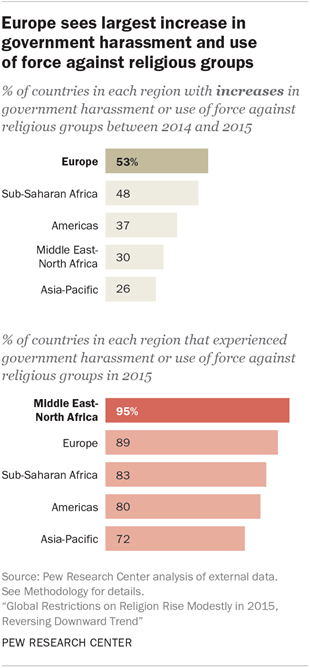
Government harassment and use of force against members of religious groups surged around the world in 2015, according to a new Pew Research Center study on global religious restrictions. But nowhere was this trend more pronounced than in Europe, where over half of countries (53%) saw an increase from the previous year.
More specifically, governments of 38 European countries (84%) harassed religious groups in limited or widespread ways in 2015, while the governments of 24 countries in Europe (53%) used some type of force against religious groups.
The increase in Europe in 2015 occurred as a record 1.3 million migrants applied for asylum on the continent. Over half of the asylum-seekers came from the Muslim-majority countries of Syria, Afghanistan and Iraq. While many of the government incidents involved long-standing tensions between religious communities and European governments, some were focused on this new, incoming population.
In addition to recording the biggest increase in government harassment and use of force against religious groups, Europe also had the second-largest overall share of countries (89%) that exhibited these types of actions. Only the Middle East-North Africa region (95%) had more governments that harassed or used force against religious groups. Sub-Saharan Africa, the Americas and the Asia-Pacific region had lower shares of government harassment or use of force against religious groups, although over seven-in-ten countries in each region had these types of government restrictions.
This analysis defines government harassment as a government offense against a religious group or against a person due to their religious identity. Harassment can include physical coercion, singling people out with the intent to make life or religious practice more difficult, or negative public comments or characterizations by the government or government officials. Government use of force includes government actions or policies that result in damage to personal or religious property, arrests and detentions, displacement, assault, or death.

Some of the harassment by European governments in 2015 involved derogatory statements about religious groups by political leaders or parties. For instance, Hungary’s prime minister, Viktor Orban, criticized the religious makeup of refugees coming into the country. In September 2015, he wrote in a German newspaper, “Those arriving have been raised in another religion, and represent a radically different culture. Most of them are not Christians, but Muslims.” He later told journalists, “I think we have a right to decide that we do not want a large number of Muslim people in our country.”
In Finland, the Finns Party became the second-largest party in parliament in 2015 after campaigning on an anti-immigration platform. The party promised to address the Somali and Muslim “problem” in Finland by tightening immigration policies, saying “society and taxpayers do not have the responsibility, voluntarily or otherwise, to give support to migrants’ feelings of identity, culture or religious practices.”
Many European governments also used force against religious groups, including damaging religious property or arresting, displacing or assaulting members of these groups. For example, in February 2015, German police raided the mosque of the Islamic Cultural Center in Bremen, saying they suspected that the mosque supported Salafist groups and that a person associated with the mosque was distributing automatic weapons for a terror attack. Police broke down the front door of the mosque, handcuffed worshippers and forced some to lie on the floor for hours. No weapons were found in the mosque. In July, a Bremen regional court ruled that the search was unlawful.
In total, 32 European governments (71%) specifically harassed Muslims during 2015, up from 27 governments (60%) the year before. The Middle East-North Africa region was the only region to have a larger share of countries that harassed Muslims (75%).
